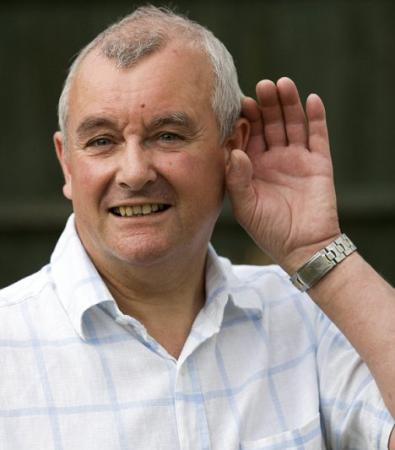据英国《太阳报》8月1日消息,英国一名男子10年前患上了罕见耳疾,竟然可以听到自己眼球转动、心脏跳动的声音,而且声音巨大。
57岁的史蒂芬-马布特(Stephen Mabbutt)10年前突然患上了神秘怪病,可以听到身体内部各个器官活动时的声响。起初,他听到自己说话的声音非常大,几乎能掩盖身边各种外界环境的噪声。大约6年前,他的病情开始恶化,开始能够听到各种器官运动时发出的声音。

“有天晚上我静静地坐在家里,突然我听见非常巨大的声响,好像用砂纸擦木头的声音。我四处查看,什么也没发现。后来我意识到,声音竟然源自我自己的眼球转动,我简直要疯了。如果我吃薯片,咀嚼时发出的声响可以掩盖周围人讲话的声音。再后来,心脏跳动的声音也可以清楚地听到,就连安静地睡觉都变得不可能了。”
经过仔细的CT扫描后,医生终于发现了病因:马布特的颅骨侧面的颞骨上有一个小洞,导致内耳中的半规管(semicircular canals)中的液体渗入了脑部,最终使身体内的声音可以被听到。
据悉,马布特的疾病在医学上非常罕见,在英国每年的发病率为五十万分之一。
英文原文:
Man who could hear his own eyeballs moving is cured after six-year agony
A father-of-two who heard his eyes scratching like 'sandpaper' every time they moved in their sockets, has finally found relief.
Stephen Mabbutt, 57, from Charlton in Oxfordshire, started experiencing symptoms six years ago.
A dull ache in his head progressed to a vibrating sensation that affected his vision every time he spoke. Meanwhile loud noises started to make him feel dizzy.

Before long Mr Mabbutt could hear his heart beating and eyeballs moving and found he could barely follow a conversation or hear the TV.
'It sounded like sandpaper on wood, that sort of noise, when I moved my eyes,' he told the Oxford Mail.
Doctors were baffled by the condition and tried to treat him with nasal sprays and antibiotics with no success.
Then surgeon Martin Burton, from the Oxford Radcliffe Hospital, noticed perforations inside the semicircular canals inside Mr Mabbutt's ear.
He was referred to Richard Irving at the Birmingham Ear Clinic, who diagnosed him with the rare condition superior canal dehiscence syndrome.
SCDS affects only one in 500,000 people in the UK and was only discovered a decade ago.
It occurs when part of the bone covering the semicircular canals is missing, which exposes the sensitive membrane underneath.
Mr Mabbutt underwent surgery in May to seal the holes. He is now back at work at Abbot Diabetes Care, where he is a training coordinator.
'You cannot believe what a relief it is,' he said.
Mr Irving said of the case: 'It is very unusual with symptoms which could easily have been dismissed. It must have been very distressing.'
He added that the condition was not difficult to treat but extremely tricky to spot in the first place.







